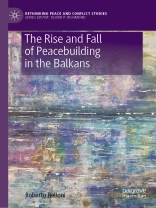This book examines the evolution of liberal peacebuilding in the Balkans since the mid-1990s. After more than two decades of peacebuilding intervention, widespread popular disappointment by local communities is increasingly visible. Since the early 2010s, difficult conditions have spurred a wave of protest throughout the region. Citizens have variously denounced the political system, political elites, corruption and mismanagement. Rather than re-evaluating their strategy in light of mounting local discontent, international peacebuilding officials have increasingly adopted cynical calculations about stability. This book explains this evolution from the optimism of the mid-1990s to the current state through the analysis of three main phases, moving from the initial ‘rise’, to a later condition of ‘stalemate’ and then ‘fall’ of peacebuilding.
विषयसूची
1 Peacebuilding in the Balkans.- 2 The Evolution of Peacebuilding.- 3 Stability and the Anti-Corruption Agenda.- 4 Addressing the Symptoms Through Civil Society Building.- 5 EUtopia and the Pull of Integration.- 6 Western Balkan Transitions and the Role of the European Union.- 7 Local Views: Scepticism towards Europe and its Consequences.- 8 Undoing International Peacebuilding from Below?.- 9 Conclusion.
लेखक के बारे में
Roberto Belloni is Professor of International Relations at the University of Trento, Italy. He has written extensively on peacebuilding and democratization, with particular reference to the Balkans. He is the holder of the Jean Monnet Chair ‘The European Union and the Western Balkans: Enlargement and Resilience’ (2018-2021).












